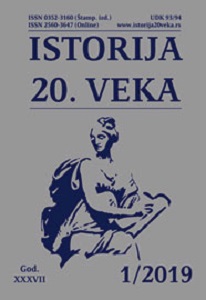Public History – istorijska praksa, alternativni pokret, naučna disciplina?
Public History – Historical Practice, Alternative Movement or a Scholarly Discipline?
Author(s): Mihael T. Antolović, Biljana Šimunović-BešlinSubject(s): History, Comparative history
Published by: Institut za savremenu istoriju, Beograd
Keywords: Historical methodology; historical scholarship; public history; applied history; popular history; digital history
Summary/Abstract: Since the 20th century, the way in which history is studied has significantly changed. The same could be said for the ways in which history is “presented” and “consumed”, both within the academic community and by the wider audience. The changes were induced primarily by innovations in the field of information and communication technologies (IT). The transition from the “Gutenberg galaxy” into the world of digital (multi) media had made historical content widely available to the general public, and had increased, to an unprecedented extent, its presence in the public discourse around the world. In addition to the press, radio and television, which are by now considered to be traditional media sources, new digital media have emerged at the end of the 20th century. The incredible fast expansion of the World Wide Web and its improved version (Web 2.0) have further altered the circumstances in which “history” is created, especially if one takes into account the appearance of new media services on the Internet, such as Youtube, Facebook, Twitter and others. The development of IT has made the question of the “public nature” of history especially significant and has led to the revitalization of the movement that emerged in the 1970s in academic circles in the United States with the aim to call attention to the relationship betweeen history and the general public – history “in the public” and history “for the public”. A new discipline was constituted within the framework of historical scholarship – public history. Translated literally into the Serbian language, public history is – javna istorija, but the designation for public history in Serbian could also be – primenjena istorija (applied history). The terms applied history and angewandte Geschichte are used in English and German respectively, but not necessarily as synonymous. In the same way as the history didactics includes the research of teaching history, public history encompasses the study of the various ways in which history is (and could be) presented (and used) outside classrooms, and outside of academic “ivory towers” – in “real life”. Hybrid in its character, since it synthesizes the methodology of several humanities (history, archeology, philology) and social sciences (sociology, anthropology, political science, communicology), and shapes the public discourse on history through traditional and new media, public history seems to be a historical discipline compatible with the modern “information societies”. Simultaneously, public history is a highly pluralistic discipline, since it includes all historical eras, as well as different theories, methods and topics in academic research. Finally, public history could be perceived as a form of democratization of historiographical practice – through its openness to personal experiences (the history of the “ordinary man”) it allows social groups that have previously been neglected by historians to come to the forefront. It also makes available the results of historical research to the broader audience, including the members of aformentioned social groups. It seems that one of the most important aims of public history at the beginning of the 21st century is to outline standards for the new kind of experts among professional historians, ones who are qualified for inovative and creative projects, both in a real and virtual environment – competent consultants, managers, administrators and executives in the field of collecting, preserving, protecting, presenting and promoting historical contents and cultural and historical heritage in cultural institutions and agencies (museums, archives, libraries, galleries), in the mass media (television, Internet), in state and local governments, as well as in tourism. The paper addresses the formation and development of public history, its general theoretical and methodological features, its scope, as well as its potential challenges and prospects. The aim of the paper is to incentivize academic historians in Serbia to consider public (and / or applied) history and further discuss this phenomenon.
Journal: Istorija 20. veka
- Issue Year: 2019
- Issue No: 1
- Page Range: 9-36
- Page Count: 28
- Language: Serbian

